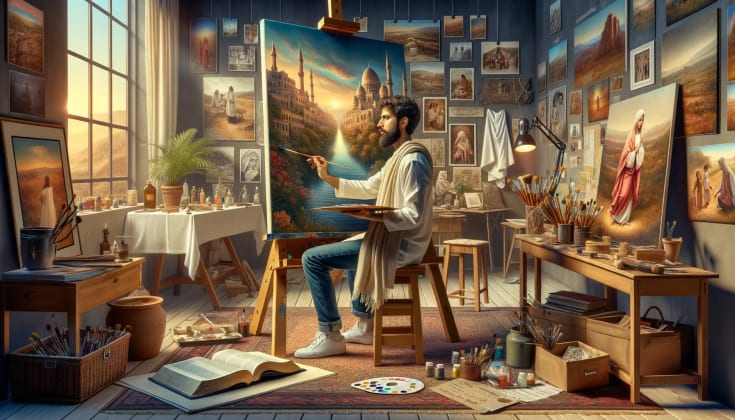Balancing Artistic Authenticity and AI Assistance
Imagine a world where AI dictates every brushstroke of a painting or every note of a worship song. Scary, right? But here's the shocking truth: We are closer to that reality than you might think, with AI dictating creative processes more than ever before. According to a 2022 study by Gartner, over 37% of organizations have already adopted AI in some form. But as Christians, how do we balance the gift of artistic authenticity with the advantages AI can bring?
In this blog post, we'll tackle these pressing questions:
- Why is artistic authenticity crucial for Christians?
- How can AI serve as a tool rather than a replacement?
- Real-world examples and personal anecdotes to guide our understanding.
- Scriptural insights and theological underpinnings.
- Practical advice for navigating this complex landscape.
Defining Artistic Authenticity in a Christian Context
As Christians, we know that our creative abilities are gifts from God. The Bible says in Exodus 35:31-32, "And he has filled him with the Spirit of God, with wisdom, with understanding, with knowledge and with all kinds of skills—to make artistic designs for work in gold, silver and bronze." The uniqueness of our creations stems from this divine wisdom and spiritual inspiration.
What is Artistic Authenticity?
Artistic authenticity refers to the genuine expression of an artist's personal feelings, beliefs, and creativity, unaltered by external pressures. As Christian creators, it encompasses our faith, our life experiences, and our connection with God.
- It’s the feeling you embed in your sermon illustrations.
- The emotion you pour into worship songs.
- The unique message conveyed through your blog post.
The Biblical Perspective
Authenticity isn’t just a quality; it's a biblical principle. Proverbs 31:30 reminds us, “Charm is deceptive, and beauty is fleeting; but a woman who fears the Lord is to be praised.” Our outward creations should reflect our inward devotion.
"Our work should be a testament to our faith, unfiltered and genuine. Anything less compromises not just our art, but our witness." — Pastor Mark Driscoll
The Promise and the Peril of AI Assistance
AI can analyze vast amounts of data, speed up tasks, and even suggest creative ideas. But it also comes with risks—above all in artistic and spiritual domains.
The Benefits
- Efficiency: AI can handle repetitive tasks, freeing us to focus on more creative endeavors.
- Inspiration: Tools like FaithGPT can offer new interpretations and insights into biblical texts, aiding in sermon preparations or Bible study sessions.
- Accessibility: AI can make art and music creation more accessible to those who lack formal training.
The Risks
- Homogenization: Over-reliance on AI can lead to a loss of individual artistic voice.
- Ethical Dilemmas: The question of authorship and originality becomes complicated.
- Spiritual Dilution: Automated spiritual content can lack the depth and authenticity of human experience.
“In creating with AI, we walk a fine line between leveraging technology and losing our authentic voice.” — Professor John Lennox, Oxford University
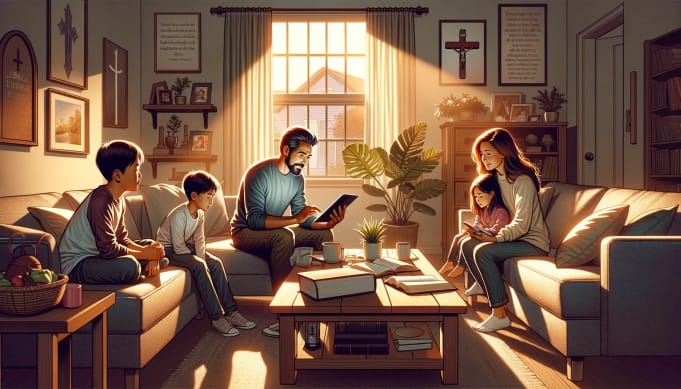
How to Keep the Balance
Balancing artistic authenticity with AI assistance might seem daunting, but it’s doable with thoughtfulness and intentionality.
Step-by-Step Guide
- Set Clear Boundaries: Define what aspects of your creative process will remain purely human.
- Use AI as a Supplement: AI should assist and not replace the human element in your work.
- Frequent Evaluation: Regularly assess how AI is impacting your creative output.
- Community Feedback: Engage your church and community for critique and validation.
Real-World Example
Consider my own project, FaithGPT. Designed to assist rather than replace, FaithGPT provides tools to help Christians engage with Scripture more profoundly. However, it’s vital to remember that no AI can replace the pastoral guidance or the community fellowship that is central to Christian life.
"AI can be the chisel in the sculptor’s hand, but the vision must come from the artist.” — Dr. Elaine Ecklund, Rice University

Addressing Common Concerns
Will AI Replace Human Creativity?
The short answer is no. Human creativity is an endowment from God, uniquely individual, and deeply connected to our spiritual journeys. While AI can aid in execution, it cannot replicate the divine inspiration and personal experience that inform our creative work.
- AI creates patterns; humans create meaning.
- AI processes data; humans process emotions.
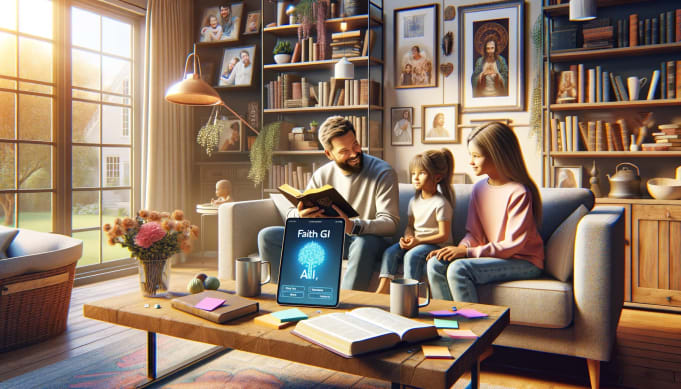
How Much AI is Too Much?
Determining the right balance is an ongoing process. Pray for discernment and remain open to feedback from trusted Christian mentors and peers. Tools like FaithGPT should enhance your work, not overshadow it.
Navigating Ethical Challenges
Ethical considerations should be at the forefront of our minds. Hebrews 13:18 reminds us, "Pray for us. We are sure that we have a clear conscience and desire to live honorably in every way."
- Attribution: Always attribute AI-generated inputs.
- Transparency: Be upfront about your use of AI.
- Guard Against Dependence: Don't let AI become a crutch.
"Guard your heart above all else, for it determines the course of your life." — Proverbs 4:23
Integrating Biblical Principles and Technology
Scriptural Guidance
Philippians 4:8 encourages us: "Finally, brothers and sisters, whatever is true, whatever is noble, whatever is right, whatever is pure, whatever is lovely, whatever is admirable—if anything is excellent or praiseworthy—think about such things."
In integrating AI, focus on:
- Truth: Ensure the truth isn't compromised.
- Purity: Maintain purity in creative outputs.
- Nobility: Uphold noble intentions behind the work.
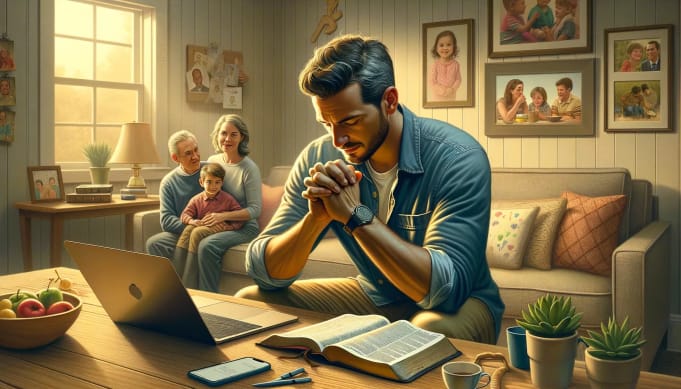
Practical Applications
AI and the Image of God (Study Guide)
Packed with Bible verses and thought-provoking questions, this study guide explores AI's effect on areas like creativity, morality, work, privacy, and the church itself.
Download Now- Seremon Prep: Use AI for research but ensure your message is Spirit-led.
- Music Creation: Let AI offer suggestions but reflect on their spiritual validity.
- Art Projects: Integrate AI tools without compromising your vision.
"In all your ways submit to Him, and He will make your paths straight." — Proverbs 3:6
Real-Life Stories and Testimonials
An Artist's Journey
Take Maria, a Christian artist who uses AI for concept sketches. Maria acknowledges that while AI speeds up initial stages, the essence and spirit of her paintings come alive only through her personal touch.
Pastor’s Insights
Pastor James uses AI to draft sermon outlines but emphasizes, "AI might help in structuring sermons, but the heart and soul of the message come from the Holy Spirit."

The Role of Community in Balancing AI and Authenticity
Importance of Community Feedback
AI and the Image of God (Study Guide)
Packed with Bible verses and thought-provoking questions, this study guide explores AI's effect on areas like creativity, morality, work, privacy, and the church itself.
Download NowBeing part of a Christian community helps in maintaining artistic authenticity. Feedback from trusted church members, friends, and mentors can offer invaluable insights.
- Collective Wisdom: When in doubt about AI's involvement in your work, seek guidance from those who share your faith.
- Spiritual Accountability: Ensure your use of AI aligns with biblical principles.
- Emotional and Spiritual Support: Discussions and prayers can help in navigating the ethical dilemmas around AI.
"Where there is no counsel, the people fall; but in the multitude of counselors there is safety." — Proverbs 11:14

Group Activities and AI
- Collaborative Projects: Use AI tools in collective creative projects to enhance productivity and innovation.
- Workshops and Seminars: Host sessions focused on ethical AI use in Christian art and creativity.
Leveraging AI Responsibly in Church Settings
Enhancing Sermons
AI can be a useful tool in preparing sermons, providing quick access to biblical texts, commentaries, and theological insights.
- Efficient Research: AI can help in gathering resources quickly.
- Diverse Perspectives: Some AI tools can offer interpretations from various biblical scholars.
Worship and Music
AI can assist in composing music or generating ideas for worship services.
- Lyric Suggestions: AI can propose biblical themes or verses for hymn writing.
- Musical Composition: Tools can suggest chord progressions or rhythms.
However, always ensure the human element—emotion, spiritual insight, and personal connection—isn't lost.
"But the hour is coming, and now is, when the true worshipers will worship the Father in spirit and truth; for the Father is seeking such to worship Him." — John 4:23
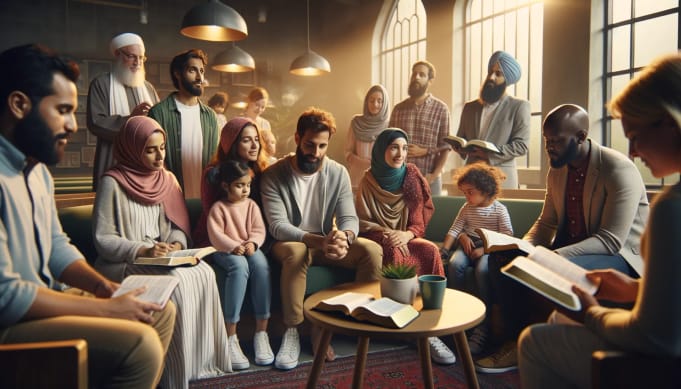
Addressing Misconceptions and Fears
AI as a Threat to Employment
A common fear is that AI will replace jobs, including those in artistic fields. However, AI should be seen as a tool that enhances human creativity rather than a replacement.
- Skill Augmentation: AI can handle time-consuming tasks, allowing humans to focus on more creative aspects.
- New Opportunities: AI may create new roles that require human oversight and creativity.
AI and Spiritual Dilution
There's a concern that AI-generated spiritual content might lack the depth and authenticity of human experience.
- AI Can Assist, Not Replace: Make sure AI complements your spiritual efforts rather than substitutes them.
- Personal Insight: Infuse personal and spiritual insights to maintain depth and authenticity.
"For we are God’s handiwork, created in Christ Jesus to do good works, which God prepared in advance for us to do." — Ephesians 2:10
Future of AI and Artistic Authenticity in the Christian Community
Prospects and Promises
The future holds immense possibilities for AI in enhancing creativity within the Christian community. It offers potential for creating works that are not just skillful but also deeply spiritual.
- Content Dissemination: AI can help in sharing gospel messages more efficiently.
- Innovation in Worship: Emerging AI technologies can introduce new forms of worship and community engagement.
"Sing to Him a new song; play skillfully with a shout of joy." — Psalm 33:3
Balancing Act
The key to future success lies in mastering the art of balancing AI assistance with authentic human creativity. Prayer, community feedback, ethical considerations, and spiritual discernment will guide us in this journey.
"Trust in the Lord with all your heart and lean not on your own understanding; in all your ways submit to Him, and He will make your paths straight." — Proverbs 3:5-6
Conclusion
Balancing artistic authenticity with AI is not just desirable; it's essential for preserving the integrity of our God-given creativity. By setting boundaries, using AI as a tool rather than a replacement, and constantly seeking God's guidance, we can navigate this new terrain with wisdom and grace.
"Every good and perfect gift is from above, coming down from the Father of the heavenly lights, who does not change like shifting shadows." — James 1:17.
